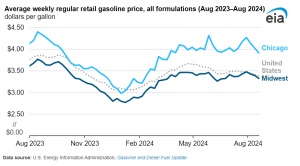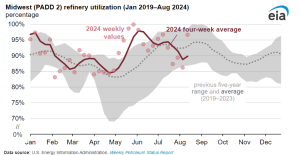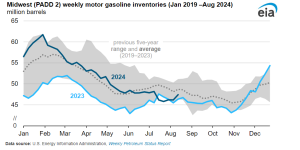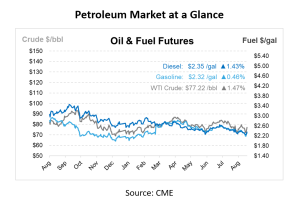
Refinery Disruptions Lead to Surge in Midwest Gasoline Prices
Recent refinery disruptions in the Midwest, particularly affecting facilities in Chicago and Ohio, have driven a sharp increase in gasoline prices across the region, bringing them unusually close to the national average. These disruptions occurred during a critical period of high seasonal demand, leading to a noticeable drop in refining activity and putting pressure on gasoline supplies.
In mid-July, severe weather caused a power outage at ExxonMobil’s Joliet refinery near Chicago, which has a capacity of 251,800 barrels per day. The facility was forced to shut down, remaining offline for several weeks before gradually resuming operations in August. This unexpected closure significantly reduced the supply of gasoline in the region, impacting an already tight market.

In addition, two refineries in Ohio—Cenovus’s Lima and Toledo facilities—experienced temporary disruptions around the same time, further straining the region’s refining capacity. The combined impact of these outages led to a significant drop in refinery utilization across the Midwest, with a decrease from 97% to 86% by mid-July. This decline in production resulted in reduced refinery production of gasoline, diesel, and other refined petroleum products.

The effects were immediate. By the end of July, gasoline stocks in the Midwest had dropped by 2 million barrels, falling below both the current year’s levels and the average for the past five years. Although there was some recovery in inventory levels as the refineries gradually came back online in mid-August, stocks remained significantly below average for several weeks, contributing to sustained price pressures.

Traditionally, the Midwest enjoys gasoline prices lower than the national average, thanks to local refining capacity and lower regional taxes. However, recent weeks have seen prices in the region climb to nearly match the U.S. average, marking a significant shift. In Chicago, where the impact of the refinery disruptions was most pronounced, prices surged, exceeding the national average by more than 20% during a three-week period from late July to early August. At their peak, Chicago’s gasoline prices were 23% higher than the national average, marking the highest price premium since 2015.

This article is part of Daily Market News & Insights
Tagged:
MARKET CONDITION REPORT - DISCLAIMER
The information contained herein is derived from sources believed to be reliable; however, this information is not guaranteed as to its accuracy or completeness. Furthermore, no responsibility is assumed for use of this material and no express or implied warranties or guarantees are made. This material and any view or comment expressed herein are provided for informational purposes only and should not be construed in any way as an inducement or recommendation to buy or sell products, commodity futures or options contracts.





